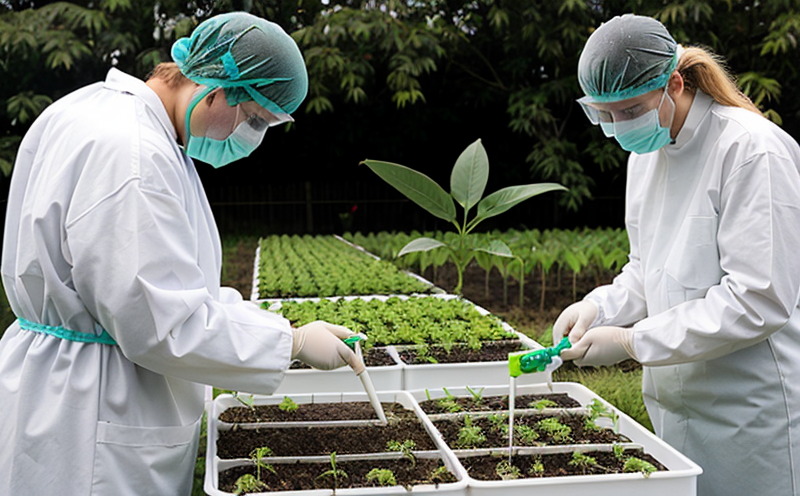Plant Disease & Pathogen Testing
The detection and identification of plant diseases and pathogens is critical to maintaining agricultural productivity and ensuring food security. Plant diseases can lead to significant yield losses, reduced quality, and economic strain for farmers and industry stakeholders alike. Pathogens such as fungi, bacteria, viruses, and nematodes are the primary culprits behind these devastating effects.
Accurate diagnosis of plant diseases is essential for implementing targeted management strategies that minimize damage while preserving crop health. This involves a comprehensive understanding of the specific pathogens involved, their lifecycle, and how they interact with host plants under various environmental conditions.
In this context, our laboratory offers specialized testing services tailored to identify and characterize both fungal and viral pathogens using advanced molecular techniques including PCR (Polymerase Chain Reaction), RT-PCR (Reverse Transcription-Polymerase Chain Reaction), and ELISA (Enzyme-Linked Immunosorbent Assay).
The process begins with the collection of symptomatic plant samples from affected fields or greenhouses. These samples undergo rigorous processing steps, which may include slicing, grinding, and extracting nucleic acids for PCR analysis or protein fractions for ELISA testing.
Once processed, these extracts are analyzed using our state-of-the-art equipment to detect the presence of specific pathogens according to internationally recognized standards such as ISO 13694:2017 for ELISA kits and EN ISO 15189:2012 for quality management systems in medical laboratories.
Our team of expert technicians ensures that all samples are handled with care, ensuring accurate results. We also provide detailed reports outlining the findings along with recommendations for mitigation measures based on our analysis.
By providing precise diagnostics early in the disease lifecycle, we enable growers and policymakers to take swift action against emerging threats before they spread further across regions or countries.
The importance of rapid diagnosis cannot be overstated; delays can result in widespread infection that becomes much more difficult—and expensive—to control. Early intervention allows for preventive treatments such as fungicides or other biopesticides, which are often less harmful to beneficial organisms compared to broad-spectrum chemicals.
Moreover, understanding the specific pathogens involved helps tailor integrated pest management programs that focus on reducing reliance on chemical inputs while enhancing natural resistance mechanisms within crops themselves. Such approaches not only improve sustainability but also contribute positively towards environmental conservation efforts worldwide.
This approach underscores why accurate plant disease testing is indispensable for both individual producers and larger-scale operations aiming to sustainably manage their resources efficiently.
Benefits
The benefits of effective plant disease and pathogen testing extend far beyond mere identification; they encompass improved crop yields, enhanced quality control measures, better resource allocation, and ultimately more resilient agricultural systems capable of withstanding future challenges posed by climate change or new emerging diseases.
- Increased Yields: By identifying and addressing early-stage infections before they cause extensive damage, farmers can optimize their production processes to maximize output. This leads not only to higher quantities but also better quality products that meet market demands more effectively.
- Better Quality Control: Regular testing ensures consistent product standards across batches, reducing variability in performance and customer satisfaction levels. It supports traceability efforts throughout supply chains, allowing for rapid identification of issues at any point along the production line.
- Efficient Resource Allocation: Knowing exactly where problems lie allows targeted application of inputs like fertilizers or irrigation water. This saves resources by avoiding wasteful practices while still meeting necessary needs.
- Environmental Sustainability: Minimizing chemical use through informed decision-making supports eco-friendly farming practices that benefit both the environment and long-term profitability.
Industry Applications
- Crop Protection Programs: Identifying pathogens early enables growers to implement appropriate control measures promptly, thereby protecting crops from widespread damage.
- Breeding & Genetic Research: Understanding the genetic makeup of both pathogen and host plant species facilitates breeding programs aimed at creating resistant varieties that can thrive even under challenging conditions.
- Regulatory Compliance: Many regions require certification demonstrating freedom from certain pathogens before allowing entry into specific markets. Accurate testing supports compliance with these regulations, opening up opportunities for international trade.
- Epidemiological Studies: Long-term monitoring of pathogen spread contributes valuable data to scientific communities studying disease dynamics and evolution patterns.
Competitive Advantage and Market Impact
Our laboratory’s expertise in plant disease and pathogen testing provides a significant competitive edge for businesses operating within the agricultural sector. By offering reliable, fast, and accurate results, we enable our clients to stay ahead of potential threats while maintaining market competitiveness.
- Risk Management: Early detection allows companies to mitigate risks associated with disease outbreaks effectively, protecting their reputation and financial stability.
- Market Access: Certification provided by our lab can open doors to new markets where stringent biosecurity measures are enforced.
- Innovation Support: Our services contribute directly to ongoing research efforts aimed at developing innovative solutions for agricultural challenges, fostering continuous improvement within the industry.
The impact extends beyond individual enterprises; it plays a crucial role in shaping global strategies towards sustainable agriculture practices. By providing robust information about disease prevalence and trends, our lab helps guide policy decisions that aim to protect public health while promoting economic growth.





